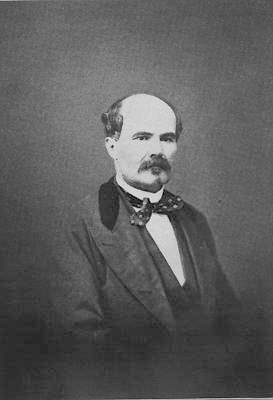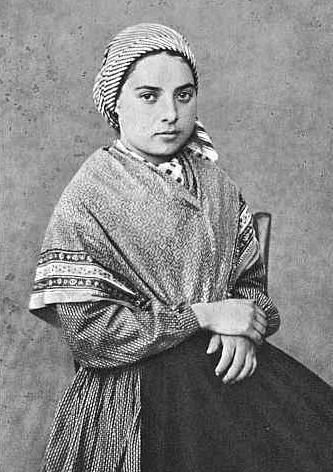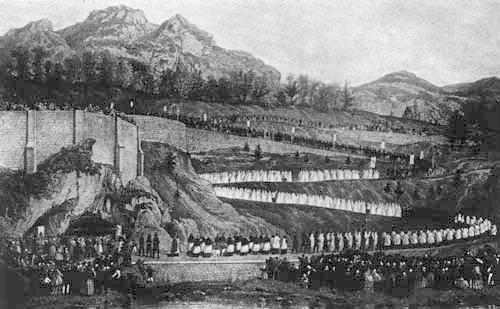
Notre Dame's Grotto / by Dorothy V. Corson

Henri Lasserre's -- Our Lady of Lourdes
 Henri Lasserre's book, Our Lady of Lourdes is a forthright detailed description of all the elements of the apparitions except the personal side of Bernadette's life in the convent, which would not have been available to the author, at that time, because she was still living.
Henri Lasserre's book, Our Lady of Lourdes is a forthright detailed description of all the elements of the apparitions except the personal side of Bernadette's life in the convent, which would not have been available to the author, at that time, because she was still living.
In his book, which was published in English in 1875, the author also tells of his own healing and that of another close friend's son. In his thought-provoking "Dear Reader" letter (quoted in the "Author's Personal Epilogue" in A Cave of Candles: The Story Behind the Notre Dame Grotto) he speaks of the extraordinary providential circumstances that led to his becoming Bernadette's official historian. It is an impressive documentation of Bernadette's Grotto experience.
Henri Lasserre concludes his book with this interesting observation:
She lives in the humility of the Lord and is dead to the vanities of this lower world. This book, which we have written and which speaks so much of Bernadette, will never be read by Sister Marie-Bernard.
The later book, written by Franz Werfel, which was made into the 1943 Song of Bernadette film, was based on Lasserre's book. Both books start with unusual personal prologues which explain how and why the books were written.
Werfel describes Bernadette as "a little creature clear as well water and yet inscrutable." Seaton's dialogue in the film portrays her protector, Dean Peyramale, once disbelieving, who then encouraged her:
Let nothing make you weaken. The Lady knows exactly what she is doing. She knows why she came to you and to none other. She knows why she is giving you this life to live, too. It couldn't be different; it had to be thus.
Lasserre describes Bernadette's last visit to the Grotto:
On the sixteenth of July, the feast of Our Lady of Mount Carmel, Bernadette had heard within her the voice which had for some months been silent, and which now no longer summoned her to the Rocks of Massabielle, then closed and guarded, but to the right of the bank of the Gave into those meadows where the multitude used to assemble to pray, safe from prosecutions and the vexatious proceedings of the Police. It was about eight o'clock in the evening. Scarcely had the child knelt down and commenced the recitation of her chaplet, when the Blessed Mother of Jesus Christ appeared to her. The Gave, which separated her from the Grotto, had almost vanished from her sight as soon as the ecstasy came over her. She saw naught before her but the blessed Rock -- to which she seemed to be as near as on former occasions -- and the Immaculate Virgin, who smiled sweetly upon her as if to confirm all the past and shed light on all the future. Not a word proceeded from her divine lips. At a certain moment She bowed Her head towards the child as if to tell her, "We shall meet again at some very distant period," or to bid her a last farewell. After this She disappeared and re-entered Heaven. This was the eighteenth Apparition and it was the last.

Bernadette's personality is reflected in pictures taken of her as a child during and after the apparitions. She became the first Saint photographed in her lifetime. In Lasserre summation of Bernadette's visions he paints a profound word portrait of the distinctive personal qualities that endeared Bernadette's to all who knew her or were touched by her story:
The testimony of the young girl offers all the guarantees we can possibly desire. There cannot be the slightest doubt as to her sincerity. Who does not, when coming in contact with her, admire her simplicity, modesty and candor? While everybody is discussing the marvels which have been revealed to her, alone, she remains silent. She never speaks unless when questions are put to her; then she enters into details without the slightest affectation, and with the most touching ingenuousness; and her answers to the numerous questions addressed to her are given without hesitation; are clear, precise, very much to the purpose, and bearing the impress of deep conviction.
Subjected to rough trials, she has never been shaken by threats, and she has declined the most generous offers with noble disinterestedness. Always d'accord avec elle-meme, she has in the different interrogatories to which she has been subjected, constantly adhered to her first statement, neither adding to nor taking away from it. Let us add that it has never been contested. Even those who opposed her, have themselves rendered her this homage.
But granting that Bernadette had no wish to deceive others, is it not possible that she was deceived herself? For instance, did she not fancy she saw and heard what she neither saw nor heard? Was she not the victim of a hallucination? How could we believe this for a moment? This wisdom of her replies reveals in the child a soundness of mind, a calmness of imagination, and a fund of good sense beyond her years. In her the religious feeling has never displayed any over-excited character; it has never been proved that she suffered from any intellectual derangement, oddity or disposition, or morbid affection which might have predisposed her to indulge in creations of imagination. She has had this vision, not once only, but as often as eighteen times; she saw it for the first time suddenly, when nothing could have prepared her for what was to be accomplished later on; and during the Quinzaine, when she expected to see the vision every day, she saw nothing for two days, although she was placed in the same way and in identical circumstances. And then what took place during the time the Apparitions were before her? Bernadette was transformed; her countenance assumed a new expression, her eyes kindled, she saw things which she had never before seen, she heard language which she had never before heard, the sense of which she did not always understand, but the remembrance of which she did not fail to retain. These circumstances joined together, preclude the idea of hallucination. The young girl has therefore really seen and heard a being styling herself the Immaculate Conception, and it being impossible to account for the phenomenon naturally, we have just ground for believing that the Apparition was supernatural.
The testimony of Bernadette -- in itself of considerable importance -- acquires altogether new strength -- we might say its complement -- from the marvelous occurrences which have taken place since this event. If a tree should be judged by its fruits, we may affirm that the Apparition, as narrated by the girl, is supernatural and divine, for it has produced supernatural and divine effects. What then happened, dearly beloved Brethren? The Apparition was scarcely heard of, when the news spread with the rapidity of lightning; it was known that Bernadette was to repair to the Grotto for the space of fifteen days, and the whole country was aroused. Crowds of people streamed towards the place of the Apparition; they waited for the solemn hour with religious impatience; and while the girl, beside herself with ravishment, was absorbed by the object of her contemplation, the witnesses of this prodigy, deeply affected and melted to tenderness, were mingled in a common feeling of admiration and prayer.
The Apparitions have ceased; but the concourse of people continues, and pilgrims, arriving from distant countries as well as from the neighboring districts, hasten to the Grotto. They are of all ages, all ranks and all conditions. And by what feeling are these numerous strangers urged to visit the place? Ah! They come to the Grotto in order to pray and to demand favors of one kind or other from the Immaculate Mary. They prove, by their collected behavior, that they are sensible as it were of a divine breath which vivifies this rock, from henceforth forever celebrated. Souls, already Christian, have become strengthened in virtue; men frozen with indifference have been brought back to the practices of religion; obstinate sinners have been reconciled with God, after Our Lady of Lourdes had been invoked in their favor. These marvels of grace, bearing the stamp of universality and duration, can only have God for their author. Consequently, have they not come for the express purpose of confirming the truth of the Apparition?

Near death, Bernadette was asked one more time to describe the Blessed Virgin. She replied, "The lady cannot be drawn or painted or embroidered." In her last moments, Werfel speaks of the nuns at her death having "a sense of being, as it were, midwives of the supernatural birth of a soul into another world."(235)